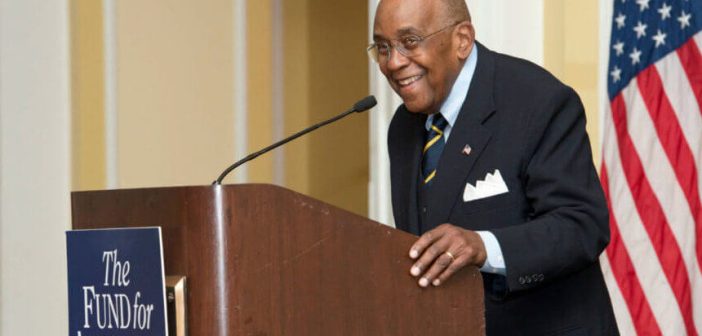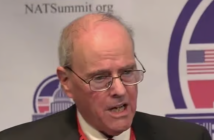The following article was originally posted on The Bull Elephant website.
As the black conservative movement continues to grow, it is important to look at early leaders who gave us great inspiration. One such person would be the late Jay Parker.
Mr. Parker’s life seemed to be based on so many themes which make this country great – hard work, patriotism, civility to those who don’t agree with you. I wish we had more people like him today because they would help us aim towards a more color-blind society where people of all stripes partner to make America a better place for all. Where merit supersedes race and capitalism is the way to succeed.
He was born James Andrew Parker on November 11, 1936 in a poor neighborhood in South Philadelphia. His grandfather, Moses Butler, was one of the founders of Zion Hill Baptist Church, so he and his brother grew up in an old-fashioned home, grounded in traditional values. He had a typical childhood in a segregated neighborhood where he and his brother worked hard at school and odd jobs; the good news is he was surrounded by role models. Parker once said, “My Christian faith shaped my life of individualism, liberty, private property, and eternal salvation.”
By 1954, he had graduated from public school and began working as a salesman for a Nashville insurance company. Meanwhile, he was reading the likes of conservatives Russell Kirk, William Buckley, Barry Goldwater, and George Schuyler.
Over the coming years, he joined the young Americans for Freedom and rose to the leadership, and he began speaking at colleges. In Philadelphia he got involved with radio: first a Christian show then later a political one. By 1978 he had founded The Lincoln Institute for Education and Research which also had a quarterly journal called The Lincoln Review. The purpose of the institute was to give black Americans “a platform, a place to share their ideas and dreams for a better tomorrow.” These endeavors gave thinkers such as Walter Williams and Thomas Sowell a voice.
Said the late historian and fellow at The Heritage Foundation, Lee Edwards, Jay Parker was “a man of firsts. The first black to sit on the national board of Young Americans for Freedom, the first black to start an integrated public affairs company in Washington (with Edwards), the first black to be president of the Washington Kiwanis.”
Besides believing that government should not be the answer to all, Parker thought a good way to break the chains of racism was through volunteer work. Among the charities he worked for were Kiwanis; Columbia Lighthouse for the Blind; Goodwill; and The Salvation Army; he also helped The National Guard. At one point he even received the Secretary of Defense’s Medal for Public Service.
In many respects we have Jay Parker to thank for Justice Clarence Thomas. After Ronald Reagan was elected in 1980, Edwin Meese III, head of the transition, asked Parker to head the team going over the Equal Employment Opportunity Commission. Parker had Thomas join him and ended up guiding him and encouraging him to take a stand on issues like being opposed to racial preferences. In 1991 President George H.W. Bush appointed Thomas to the U.S. Court of Appeal in Washington, D.C.; within a year, he was nominated to take Justice Thurgood Marshall’s place on the Supreme Court. Thomas always thanked Parker for all he had done for him, solid advice and a shoulder to lean on. A mentor.
Parker also advised many young conservatives besides Thomas. Ron Robinson, the founder and president of Young America’s Foundation; Frank Donatelli, political director for the Reagan White House; and Dr. Robert Moffit, a senior research fellow at The Heritage Foundation.
During the Reagan years, Parker worked in various capacities for the administration. Again, helping Attorney General Meese with a committee on missing and abused children; Charlie Wick, Director of the United States Information Agency on creating more positive messages for a world audience; and Donald Devine, the head of the Office of Personnel Management to improve the caliber of federal employees hired. He and his cohorts also tried to influence many of the African countries who had fallen into the trap of Marxism – these were the years with battles between the Soviet Union and the USA — but to little avail.
One of the people who worked with Jay Parker and became a close friend was Allan Brownfeld, writer, former staffer to a Vice President, Congressmen, as well as a long list of political accomplishments. In an email he told me that he and Jay had met in the late 1960s. At the time Brownfeld was the editor of The New Guard, the magazine for the Young Americans for Freedom which Jay later got involved with as well. He also worked on two books with Parker: What the Negro Can Do About Crime and a biography on Angela Davis, not to mention running The Lincoln Institute and publishing The Lincoln Review.
We lost Jay Parker to cancer on Sept. 14, 2015. A wife, daughter, and quite a legacy were left behind.
Said Brownfeld, “Jay’s friends included both liberals and conservatives. He was a real gentleman. I never heard him insult anyone because of political disagreements. I think he would be very depressed with today’s politics of constant insult. In his view Republicans and Democrats were not enemies but were engaged in a common democratic enterprise. Together, they defeated Communism and won The Cold War.”
He also explained Parker was a strong believer in free trade and the economics of Milton Friedman. Not to mention he wouldn’t approve of tariff wars with friends like Canada.
I had the pleasure of knowing Parker in the early 1980s. He was a kind and genteel soul who wore crisp suits and a fedora. He led by example and wasn’t interested in the limelight.
When I graduated from Kenyon College in 1979, much to my parents’ chagrin, I flew off to travel around New Zealand and Australia where I had friends. I ended up in Perth, Australia, waiting tables and eventually decided to crew on sailboats for a year in the Indian Ocean and Red Sea, finally settling down in the Seychelles, a beautiful archipelago a thousand miles off the coast of West Africa but a Communist nation and Soviet satellite. We had few freedoms; politics was dangerous, and we had coup d’etats from time to time and people were imprisoned or killed. The dictator always won. After an especially bad coup, I flew home to the U.S. and wrote about my experiences in an article entitled “Third World Diary” which Parker eventually published in The Lincoln Review.
In a word he and Allan Brownfeld gave me a start as a writer.



